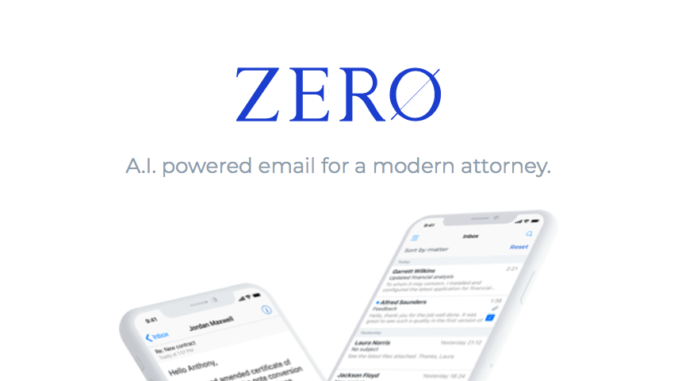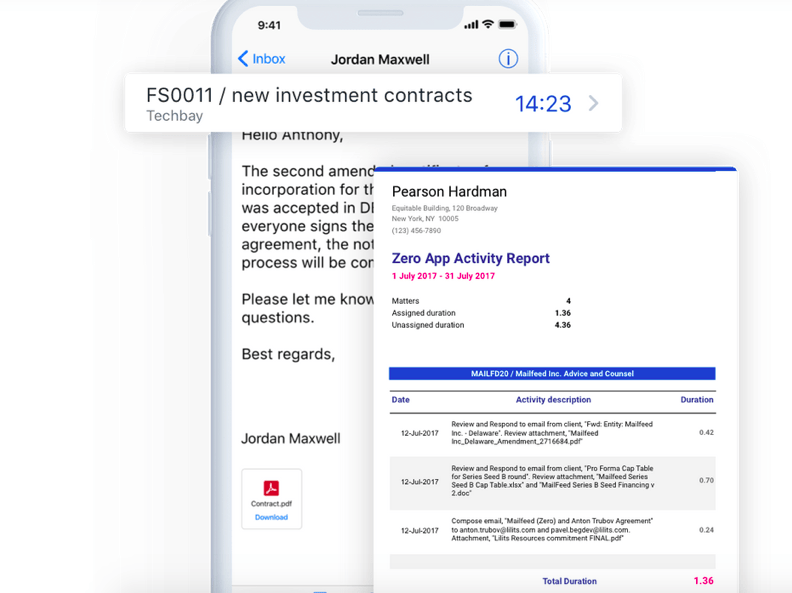
Artificial Lawyer recently caught up with the Los Gatos, California-based, legal AI company, Zero, and spoke to Peter Darling, CMO, and Alex Babin, CEO and Co-founder at the email-focused start-up.
But, hold on a moment, email, you say? What’s that got to do with AI and the new wave of legal tech innovation? Surely email is just email and there isn’t much more going to happen with it? Not so, says Zero, which sees plenty of positive change it can deliver here, and change that will work through to a law firm’s bottom line very quickly.
Its key message is this: ‘Email is the nervous system of a modern law firm. Unfortunately, the basic technology of email hasn’t advanced much in decades. Combine these two factors and you have a significant pain point.’
As Darling and Babin add, a critical factor now is that many lawyers are working off mobile devices, from iPads to iPhones. Zero states that many lawyers do not have the tech infrastructure to accurately bill legal work conducted through a mobile device.
‘For example, Apple mail is a closed system and so you can’t plug in time capturing systems. Mobile is just a blackbox and you can’t track billable time with it. So people guess,’ says Darling. Or they simply write that time off that they spend working on and composing emails for clients while out of the office.
While some lawyers may spend most of their time at their desk, others, for example trial attorneys in the US, may spend a significant amount of their time outside the secure and highly structured tech environment of the office. Transactional lawyers may also find they are constantly on the move, zooming from one part of the US to another, or abroad, as the deal may demand.

That is a lot of time out of the office where lawyers cannot easily show what they done. And, given that the billable hour still reigns, if not for client uses then for internal billing reasons, this matters. The company estimates that it can help recover between half an hour to one hour of billable effort per day for those on the move. Scale that across a whole year, for a whole firm, and you have a lot of additional billable work that might be lost if lawyers have to ‘guess-timate’ their mobile work time, often without the ability to create accurate narratives around what they’re doing via a device.
Babin explains that they now have a solution the team has been working on since 2015 with a large group of tech experts, with plenty of PhDs. This solution has a large group of investors behind it, including NFX Guild; Acorn Pacific Ventures; Philip Hoare, the former CIO of leading US tech law firm, Wilson Sonsini; and Michael Antonov, the co-founder at Oculus Rift.
So, what does Zero do? The platform has several aspects and others that are also being considered, but for now the core benefit is its use of natural language processing (NLP) to fillet your emails to produce a billing narrative for you.
As Darling says, it picks up things like dates, names, places and helps you to log the matter clearly.
This NLP facility can also help to provide an improved sorting and filing system that can very quickly present a user with the most important emails first, such as ones where it’s clear there is on going client work.
‘Zero reads and sorts your emails via 60 parameters and also uses behavioural analysis based on previous email use,’ Babin explains.
In a world where commercial lawyers could be receiving 200+ emails a day, whether directly or CC-ed, then that helps. It also helps reduce wasted time on the move trying to sort manually what is relevant and what can wait.
Babin also notes that Zero supports mobile filing with iManage/RAVN and NetDocuments, with information in such document management systems helping Zero to provide predictive input.
But, now comes the second leg, security.
Law firm tech security teams worry about mobile devices and they also worry about lots of sensitive data being processed in the cloud. Are all these fears justified? The jury is still out on the cloud issue. But, there it is, people are worried about it.
Zero has addressed this fear by ensuring that the NLP processing, or what we can generically call ‘the AI bit’, doesn’t make use of an external cloud to handle the processing. It’s all done internally on the phone through the downloaded Zero app.
Babin points out that this is helpful in several ways. Naturally it removes paranoia about sensitive data being sent to a third party cloud system, and, as he says: ‘This means that you don’t have to change the tech infrastructure of the law firm.’
Firms can be reassured that although new capabilities have been added, to an iPhone, for example, no information on the mobile device is going anywhere it wasn’t before. ‘This is critical,’ stresses Babin.
And, there’s more. Once you have this digital and detailed record of work of when you are mobile, then this can be analysed. Work streams for certain clients can be analysed and benchmarked for future use. Overall productivity can be studied too.
At present Zero is focused on Apple products, which the team says is one of the most popular platforms for US lawyers now with very few people still using the dear old Blackberry.
The reality is that every lawyer today uses a mobile device and in turn this means that Zero is potentially massively scalable. While the company may not be that well known yet, it could become a mainstay of the legal tech scene if all goes to plan.
